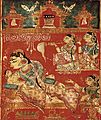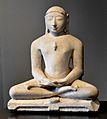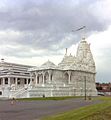Jainism facts for kids
Quick facts for kids Jainism |
|
|---|---|

The Jain flag In India
|
|
| Abbreviation | Jain |
| Scripture | Jain Agamas |
| Other name(s) | Jain Dharma |
Jainism is a South Asian religion that teaches non-violence towards all living beings. Jain philosophy is the oldest philosophy of India that distinguishes body(matter) from the soul (consciousness) completely. It rests on the principle of Nonviolence (ahimsa) and Non-possessiveness (attachment to possessions). It teaches that the universe is eternal and that every living being has a soul which has the power to become God. A soul which has won over its inner enemies like attachment, greed, pride, etc. is called jina which means conqueror or victor. Such great souls are considered God. Self-control is considered the means to obtain liberation or Godhood.
Jainism teaches that 24 great souls called tirthankaras (Teaching gods) are born from time to time to revive Jaina faith. In the modern world, it is a small but influential religious group with about 4.2 million followers in India, and growing immigrant communities in North America, Western Europe, the Far East, Australia and elsewhere.
Jains have sustained this ancient religion to this era and have significantly influenced and contributed to ethical, political and economic spheres in India. Jains have an ancient tradition of scholarship and have the highest degree of literacy in India; Jain libraries are the oldest in the country. Tamil Jains and Tulu Jains have lived in parts of Tamil Nadu and Karnataka since th 1st century BC. Even though South Indian Jains are distinguishable in some of their routines and practices from North Indian Jains, the core philosophies and belief systems are the same for both cultures.
Main points
- Every living being has a soul.
- Every soul is potentially divine, with innate qualities of infinite knowledge, perception, power, and bliss.
- Jainists think of every living being as themselves, harming no one and be kind to all living beings.
- Every soul is born as a celestial, human, sub-human or hellish being according to its own karmas.
- Every soul is the architect of its own life, here or hereafter.
- When a soul is freed from karma's, it becomes free and attains divine consciousness, experiencing infinite knowledge, perception, power, and bliss.
- Navakar Mantra is the fundamental prayer in Jainism and can be recited at any time of the day.
- Non-violence, this includes compassion and forgiveness in thoughts, words and actions toward all living beings and respecting views of others.
- Jainism stresses on the importance of controlling the senses including the mind, as they can drag one far away from true nature of the soul.
- Limit possessions and lead a pure life that is useful to yourself and others. Owning an object by itself is not possessiveness; however attachment to an object is. Non-possessiveness is the balancing of needs and desires while staying detached from our possessions.
- Enjoy the company of the holy and better qualified, be merciful to those afflicted souls and tolerate the perversely inclined.
- It is important not to waste human life in evil ways. Rather, strive to rise on the ladder of spiritual evolution.
- The goal of Jainism is liberation of the soul from the negative effects of unenlightened thoughts, speech and action.
- Jains mainly worship idols of Jinas, Arihants and Tirthankars, who have conquered the inner passions and attained divine consciousness.
- Right View, Right Knowledge and Right Conduct (triple gems of Jainism) provide the way. There is no supreme divine creator, owner, preserver or destroyer. The universe is self-regulated and every soul has the potential to achieve divine consciousness (siddha) through its own efforts. According to Jain philosophy, a soul in its pure form is God.
God
According to Jainism, the universe was never created, nor will it ever cease to exist. It is independent and self-sufficient, does not require a creator, nor any superior power to govern it, nor a judge nor destroyer. Jainism believes in the world of gods and hell beings who are born and who die to be reborn like living beings in the earthly realm of existence.
Those souls who live in the body of a god, do so because of their positive karma. The gods live a life of happiness, fun and frolic, whose wishes are automatically fulfilled. They also possess a more transcendent knowledge about material things and can anticipate events in the human realms. However, once their past karmic merit is exhausted, the souls leave the "god body" and are reborn again as humans, animals or other beings.
Jains in the modern era
Followers of the path practised by the Jinas are known as Jains. The majority of Jains currently reside in India. With four to five million followers worldwide, Jainism is relatively small compared to major world religions. Jain communities can be found in Europe, the United States, Canada and Kenya.
According to the National Family and Health Survey conducted in 2015-16, Jains form the wealthiest community in India. Jains have the highest literacy rate (87%) in India, in the 7-years to oldest age group, according to its 2011 census. The Jaina community also has the highest number of college graduates. Excluding the retired senior citizens, Jain literacy rate in India exceeded 97%. Further, Jain males have the highest work participation rates.
Images for kids
-
Jain temple painting explaining Anekantavada with Blind men and an elephant
-
Nishidhi stone, depicting the vow of sallekhana, 14th century, Karnataka
-
Praying at the feet of a statue of Bahubali
-
Rishabhdev, believed to have lived over 592.704×1018 years ago, is considered the traditional founder of Jainism.
-
Parshvanath Temple in Khajuraho
-
Jain temple, Antwerp, Belgium
See also
 In Spanish: Jainismo para niños
In Spanish: Jainismo para niños
























